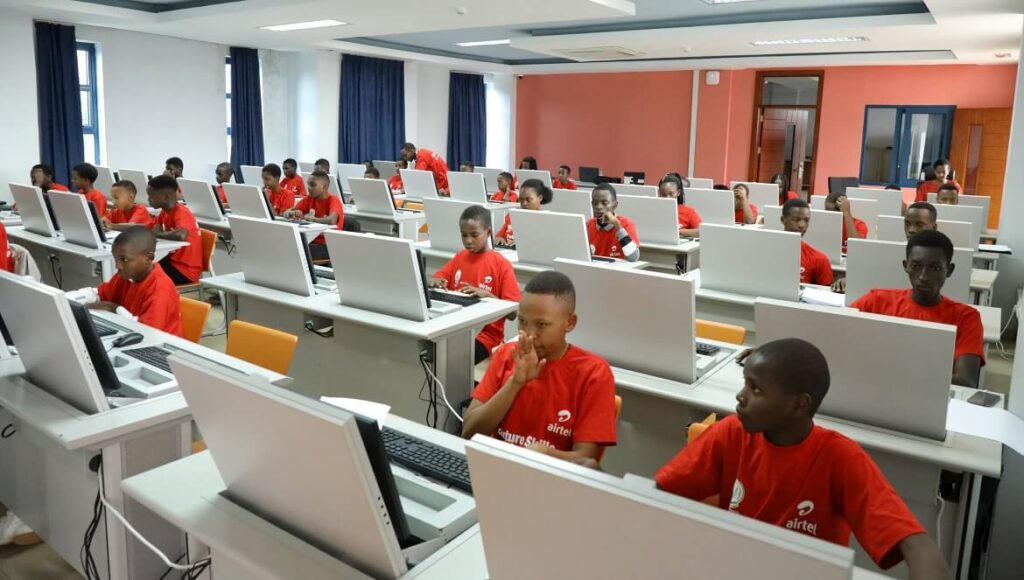“Africa is embarking on a journey towards a future defined by the vibrancy of its youthful population, the dynamic transformation of its urban landscapes, the pressing challenges of climate change, the expanding digital horizons, the spirit of collaboration among its nations, and the inspiring ingenuity of its entrepreneurs.”
By Hadia Safeer
Imagine the children of the world in the year 2050. Surprisingly, nearly half of them—around 40%—will hail from Africa if current demographic patterns persist. These young ones will be born and raised amidst the diverse landscapes of the continent, shaped by its rich cultures and traditions.

As digital connectivity continues to expand, a significant portion of these children will become proficient users of technology, with some emerging as pioneering innovators, contributing to Africa’s burgeoning tech scene. The majority of them will experience childhood in bustling urban centers, witnessing firsthand the rapid growth and transformation of cities that double in size during their formative years. Yet, amid these urban landscapes, many will also grapple with the harsh realities of climate change, underscoring the urgent need for sustainable solutions and global cooperation.
Furthermore, as these young Africans mature, they will not only represent a vast consumer market but also comprise a significant portion of the global workforce. Their collective influence could shape the trajectory of international business and drive the evolution of emerging markets. However, despite their potential, none of the institutions poised to influence their lives—be it businesses, governments, civil society organizations, or development agencies—are adequately equipped to address the opportunities and challenges posed by this demographic shift.
Thus, there is an urgent need for comprehensive strategies and collaborative efforts to empower and support these young Africans as they navigate their roles in shaping the future of their communities and the world at large.
MATTER OF CONCERN: AFRICA’S FUTURE
The ongoing African baby boom represents just one facet of the profound changes underway across the continent. Alongside this demographic shift, Africa is experiencing the rapid growth of megacities as urbanization accelerates. Simultaneously, there’s a burgeoning expansion of internet access and digital connectivity, opening up new avenues for communication, education, and economic opportunity. However, amidst these transformations, the escalating impacts of climate change loom large, presenting formidable challenges to communities and ecosystems.
Moreover, there’s a palpable momentum toward greater international cooperation within Africa, signaling a collective effort to address shared concerns and pursue common goals. This spirit of collaboration extends to the realm of innovation, where local ingenuity is driving remarkable advancements, often spearheaded by women and young entrepreneurs. These individuals are not just shaping the future of their communities; they are also trailblazing paths of progress for the entire continent.
In essence, Africa’s journey into the future is characterized by a tapestry of interconnected megatrends, each weaving its unique narrative into the fabric of the continent’s evolving story. As we bear witness to these transformations, it becomes increasingly evident that the key to navigating this dynamic landscape lies in fostering inclusive growth, empowering diverse voices, and embracing innovation as a catalyst for positive change.
Tapping into the boundless potential of Africa’s people lies at the heart of crafting a promising future for its populace — a future that not only uplifts the lives of its citizens but also propels forward the trajectory of global economic prosperity and development.
SIX TRANSFORMATIVE MEGATRENDS:
1. AFRICA YOUTH WILL BE A DRIVING FORCE
In the unfolding narrative of Africa’s trajectory towards the mid-21st century, one overarching theme emerges: its youth will be its driving force. By 2050, the continent’s population, spanning sub-Saharan and North Africa, is poised to double, swelling to a staggering 2.5 billion souls. Notably, a significant 60% of Africa’s populace will be under the age of 25, embodying a reservoir of potential and vitality. While such a youthful demographic landscape may present challenges, including the specter of unrest and mass migration in the absence of adequate employment opportunities, it also heralds a transformative opportunity.
With the right conditions, this burgeoning youth cohort stands poised to spearhead economic growth, particularly in sectors hungry for innovation and skilled labor—ranging from manufacturing to the burgeoning domains of renewable energy and digital technology.
With its youthful population and a combined GDP estimated at $2.96 trillion in 2022, Africa stands on the brink of emerging as the preeminent growth market for consumer goods and services globally. Moreover, it is poised to serve as a vital wellspring of talent, exporting a cadre of digital natives and skilled labor to the far reaches of the world. However, the realization of these promising prospects hinges upon the concerted efforts of educational institutions, bolstered by strategic investments from both governmental and private quarters.
This imperative task demands the scaling up of schooling, skills training, and ancillary services—a monumental endeavor that could necessitate the recruitment of up to 17 million additional professional educators. As articulated by Florie Liser, CEO of the Corporate Council on Africa, “To meet the burgeoning demand for employment among Africa’s youth, countries must harness their capacity to add value, positioning themselves as formidable players within regional and global supply chains, thereby catalyzing their development trajectory.”
2. AFRICA CITIES: WILL BE CROWDED
As Africa’s urban areas brace for an influx of an additional 1 billion residents by 2050, the landscape is poised for a seismic transformation. Forecasts indicate a tripling of the urban population and a notable expansion in the number of “megacities,” from three at present to a projected 14. While this rapid urbanization promises to infuse dynamism into the region’s economy and cultural milieu, it also poses formidable challenges.
The provision of essential services such as electricity, education, and transportation infrastructure may strain under the weight of such swift demographic shifts. Yet, with concerted and swift investment in infrastructure, urbanization can catalyze economic growth, spur innovation and entrepreneurship, and foster greater collaboration between government, the private sector, and the workforce. As aptly underscored by Yvonne Tsikata, former World Bank Vice President and Corporate Secretary, “Succeeding in our development endeavors hinges crucially on fostering robust dialogue among all stakeholders.”
3. AFRICA CONTINENT: WILL BE VULNERABLE TO CLIMATE CHANGE
Despite its relatively minor contribution to global greenhouse gas emissions, Africa faces outsized vulnerability to the effects of climate change, with 35 of the 50 most at-risk countries situated on the continent. Projections indicate a rapid increase in temperatures, outpacing the global average, leading to the complete deglaciation of Africa’s mountainous regions by 2050, escalating sea levels along coastlines, and a surge in extreme weather phenomena like droughts, storms, and floods. These changes pose a dire threat to biodiversity, particularly concerning as Africa shelters a quarter of the world’s remaining rainforests. Additionally, livelihoods dependent on agriculture and energy production are at risk due to weather-related vulnerabilities, while the spread of diseases is exacerbated.
To address these challenges, African leaders must prioritize filling existing gaps in climate-related data availability, ensuring accurate and timely information dissemination to communities. Joanne Yawitch, CEO of the national business initiative in South Africa, emphasizes the importance of educating people on how to interpret and act upon such data. Despite the daunting outlook, many experts see Africa as poised to lead in climate innovation, potentially cultivating a $320 billion industrial sector.
Renewable energy holds significant promise, leveraging abundant solar, wind, and geothermal resources, alongside experience with off-grid solar solutions. Carbon sequestration initiatives can capitalize on Africa’s vast lands, forests, and coastlines, while sustainable land use and agriculture offer avenues for green job creation and environmental stewardship.
4. AFRICA DIGITAL TECHNOLOGY: WILL BE FASTER
The rapid evolution of Africa’s digital technology sector is poised to outpace current expectations. Since 2010, the sector, encompassing software, cloud, and internet services, has witnessed remarkable growth, boasting a five-year growth rate of 47%. Internet penetration has surged tenfold over the past 12 years, with projections indicating that the internet economy will soar to $712 billion by 2050. Across the continent, more than 600 active digital and technological hubs are driving innovation, with both indigenous and global companies playing pivotal roles. Notably, Egypt, Kenya, Nigeria, and South Africa emerge as leading hubs of digital activity, closely followed by Ghana, Morocco, and Tunisia.
5. AFRICA REGION: WILL BE MORE OPEN TO INTERCONTINENTAL COOPERATION
The COVID-19 pandemic and the ensuing food crisis have served as wake-up calls for African leaders, both in the public and private sectors, highlighting the urgent need for greater self-sufficiency across the continent. Recognizing the imperative for enhanced cooperation and reduced dependence on international aid, several initiatives have been launched to steer Africa in this new direction.
A pivotal development came in 2018 when 44 out of 55 African countries signed the African continental free trade area agreement (AFCFTA), heralding the creation of the world’s largest trade bloc by population and land area, encompassing 1.3 billion people. With 54 member states having signed the agreement as of 2021, progress is steadily being made towards its operationalization.
Overcoming historical challenges such as logistical issues, visa barriers, and existing trade impediments will be crucial for the pact to unlock its immense economic potential. Charles Boamah, former senior vice president of the African development bank, underscores the significance of the AFCFTA, stating, “Its potential impact in addressing critical continental issues like food insecurity is immense. Sustaining the political will that led to this landmark agreement is essential for its effective implementation and the fulfillment of its promise.”
Furthermore, the adoption of agenda 2063 by the African Union in 2015 marks another significant step towards fostering intercontinental collaboration. This blueprint for future projects, including the development of high-speed rail systems, reflects Africa’s commitment to its long-term growth and prosperity. Additionally, there is a growing momentum towards reinforcing continental and regional organizations such as the African Union, the southern African development community, and the economic community of West African states, underscoring the continent’s determination to forge a united and resilient path forward.
6. AFRICA REGION: WILL BE SOURCE OF INNOVATION
Africa’s entrepreneurial spirit is a beacon of hope, with around 22% of working-age Africans venturing into small businesses, surpassing rates in Latin America and Asia. The continent has carved a niche in innovation, spearheading breakthroughs like mobile payment systems and digital healthcare platforms. What’s truly remarkable is Africa’s commitment to gender equality in entrepreneurship, with African women leading the charge—twice as likely to embark on entrepreneurial journeys compared to their counterparts elsewhere.
Fueling this innovation are Africa’s vibrant digital hubs, serving as hotbeds for creativity and collaboration. However, the entrepreneurial landscape extends far beyond technology, permeating sectors like energy, healthcare, pharmaceuticals, and sustainable agriculture. This transformative wave of entrepreneurship holds the promise of addressing pressing challenges such as food scarcity aggravated by climate change.
Indeed, Africa’s agricultural sector stands poised for exponential growth, with projections suggesting annual revenues could soar to $320 billion by 2030. This surge not only alleviates food shortages but positions Africa as a potential breadbasket for Europe and the Middle East, underlining the continent’s pivotal role in shaping the global economy and fostering sustainable development.
In conclusion, successfully navigating these megatrends holds the key to advancing Africa’s social and economic prosperity. History is replete with examples of emerging economies harnessing the potential of their youthful demographics and entrepreneurial zeal to drive innovative growth and development. Africa stands at a pivotal juncture where targeted investment and strategic initiatives can unlock its immense potential, paving the way for a future defined by progress, prosperity, and inclusive development.
Author: Hadia Safeer Choudhry – International Relations student with solid academic basis in Diplomatic Relations, International Law and Intercultural Communication. Her writings focus on international relations, feminism and current trends.
(The views expressed in this article belong only to the author and do not necessarily reflect the editorial policy or views of World Geostrategic Insights).
Image source: New African Magazine







